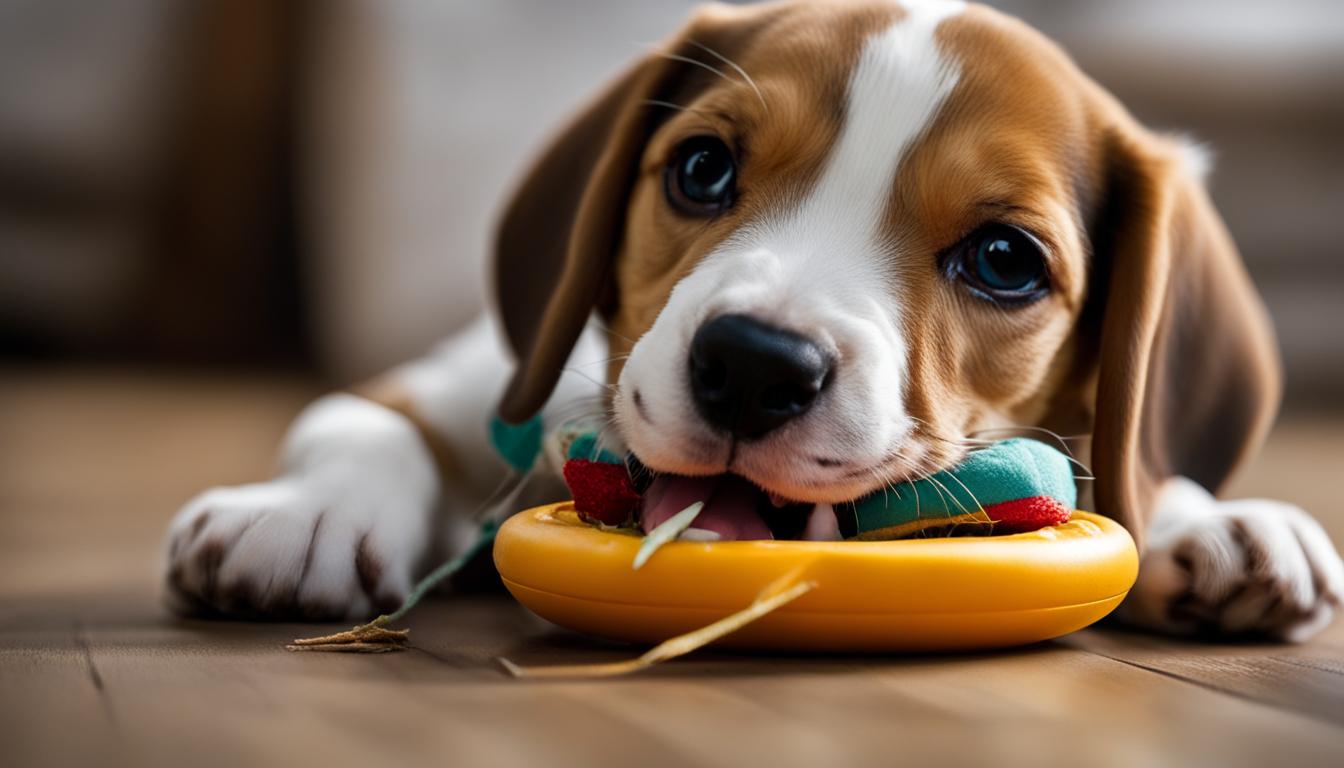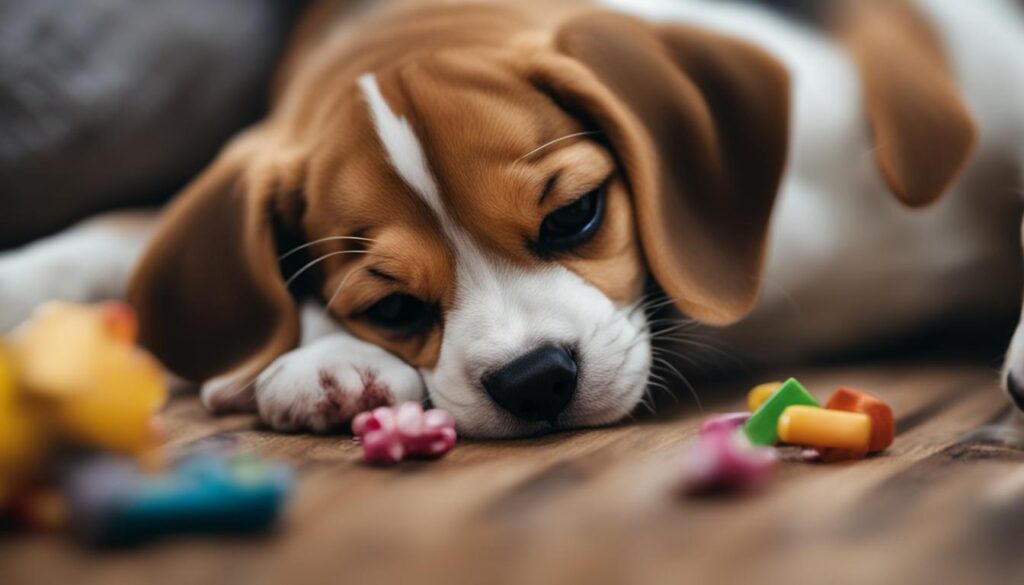Physical Address
304 North Cardinal St.
Dorchester Center, MA 02124

Beagle puppies are adorable bundles of energy and playfulness. However, they also have a habit of biting a lot, which can be quite frustrating for pet owners. Understanding the reasons behind this behavior is crucial in managing and redirecting it effectively.
There are several factors that contribute to a beagle puppy’s biting behavior. It can be influenced by teething, play biting, separation anxiety, or even aggression. Each of these factors requires a different approach and understanding.
Teething is a common reason for excessive biting in beagle puppies. During the teething phase, which typically occurs between four to eight months old, puppies experience discomfort in their gums and look for objects to chew on for relief.
It’s important to provide appropriate teething toys and train your puppy to use them instead of biting on furniture or hands. Clapping your hands or saying “ouch” when your puppy bites and redirecting their attention to a teething toy can help discourage biting behavior during this phase.
| Teething and Biting | Tips to Discourage Biting |
|---|---|
| Provide teething toys | Give your puppy appropriate teething toys to chew on. |
| Avoid using hands as chew toys | Train your puppy to use teething toys rather than biting your hands. |
| Positive reinforcement | Praise your puppy when they use teething toys instead of biting inappropriately. |
| Redirect attention | Clap your hands or say “ouch” when your puppy bites and redirect their attention to a teething toy. |
By providing appropriate teething toys and teaching your beagle puppy to use them, you can help alleviate their teething discomfort and discourage biting on inappropriate objects.

Beagle puppies are naturally playful and curious, and one way they express this behavior is through play biting. It’s their way of exploring the world around them and learning about social boundaries. When they interact with their littermates, they quickly learn that biting too hard elicits a yelp and a negative response.
As responsible pet owners, it’s important for us to mimic this response when our beagle puppies bite too hard. By saying “ouch” and withdrawing attention, we can teach them that biting is not acceptable behavior. Consistency is key in reinforcing this lesson, so it’s important to respond the same way every time they bite too hard.
When your beagle puppy bites too hard, say “ouch” and withdraw attention. Consistency is key in teaching them appropriate play behavior. Remember, they want to please you and will quickly learn what is expected of them.
Positive reinforcement also plays a crucial role in teaching beagle puppies appropriate play behavior. When they play gently and refrain from biting, it’s important to reward them with praise, petting, or a treat. This positive association encourages them to continue behaving well during playtime.
Proper socialization is another essential aspect of preventing excessive play biting. By introducing our beagle puppies to new experiences, environments, and other dogs and people, we help them develop a well-rounded understanding of social interactions. This exposure helps reduce the likelihood of aggressive or rough biting behavior.
When socializing your beagle puppy, start with controlled environments and gradually expose them to different situations. Allow them to interact with well-behaved and vaccinated dogs, ensuring the play sessions are supervised. This helps them learn appropriate play etiquette and develop good social skills.
By employing consistent training techniques, positive reinforcement, and proper socialization, we can effectively prevent excessive play biting in our beagle puppies. It helps create a harmonious and enjoyable relationship between us and our furry friends, fostering a safe and happy environment for everyone.
table {
border-collapse: collapse;
width: 100%;
margin-top: 20px;
}
th, td {
border: 1px solid #ddd;
padding: 8px;
text-align: center;
}
th {
background-color: #F2F2F2;
}
| Pros of Play Biting | Cons of Play Biting |
|---|---|
| Helps puppies explore their world | Potential for accidental injury |
| Can be a bonding experience with your puppy | May develop into problematic biting behavior |
| Teaches bite inhibition and social boundaries | Disrupts play sessions with other dogs |
Separation anxiety can be a common cause of biting behavior in beagle puppies. When these pups feel anxious or fearful about being left alone, they may resort to biting as a plea for attention or an attempt to prevent their owners from leaving. This can be a distressing behavior for both the puppy and their human companions.
To address separation anxiety-related biting, it’s important to implement training techniques that gradually desensitize the puppy to being alone. This can be achieved by gradually increasing the amount of time the puppy spends alone, starting with short periods and gradually working up to longer durations. Providing mental stimulation, such as interactive toys or puzzle feeders, can also help alleviate anxiety and redirect their focus away from biting.
Biting as a result of separation anxiety is a cry for attention and a sign that your beagle is struggling with being left alone. By implementing consistent training techniques and providing mental stimulation, we can help our furry companions overcome their anxiety and develop healthier coping mechanisms.
While aggressive biting is relatively rare in beagles, it can still occur due to health issues or a perceived need for self-protection. If your beagle exhibits aggressive biting behavior, it’s crucial to consult with a veterinarian to rule out any underlying medical conditions that may be contributing to the behavior. In some cases, professional training assistance may also be necessary to address aggression effectively.
Remember, addressing and modifying biting behavior requires patience, consistency, and understanding. With the right training techniques and appropriate interventions, we can help our beagle puppies overcome their biting problems and develop into well-behaved and happy companions.
Managing and resolving beagle puppy biting behavior requires proper training and understanding. By identifying the underlying causes of biting, such as teething, play biting, separation anxiety, or aggression, we can implement effective techniques to discourage and redirect this behavior. Consistency is crucial in teaching our beagle puppies appropriate biting boundaries.
Positive reinforcement is another valuable tool in our training arsenal. By rewarding our puppies when they exhibit good behavior and redirecting their attention to appropriate chew toys, we can help them learn that biting is not acceptable. Additionally, proper socialization is key in teaching our beagles how to interact with other dogs and people, reducing the likelihood of aggressive or rough biting.
If biting persists or becomes aggressive, it is important to seek professional help. A trainer or veterinarian can assess the situation, rule out any underlying health issues, and provide expert guidance on managing this behavior. Remember, our ultimate goal is to create a safe and happy environment for both our beagles and ourselves.